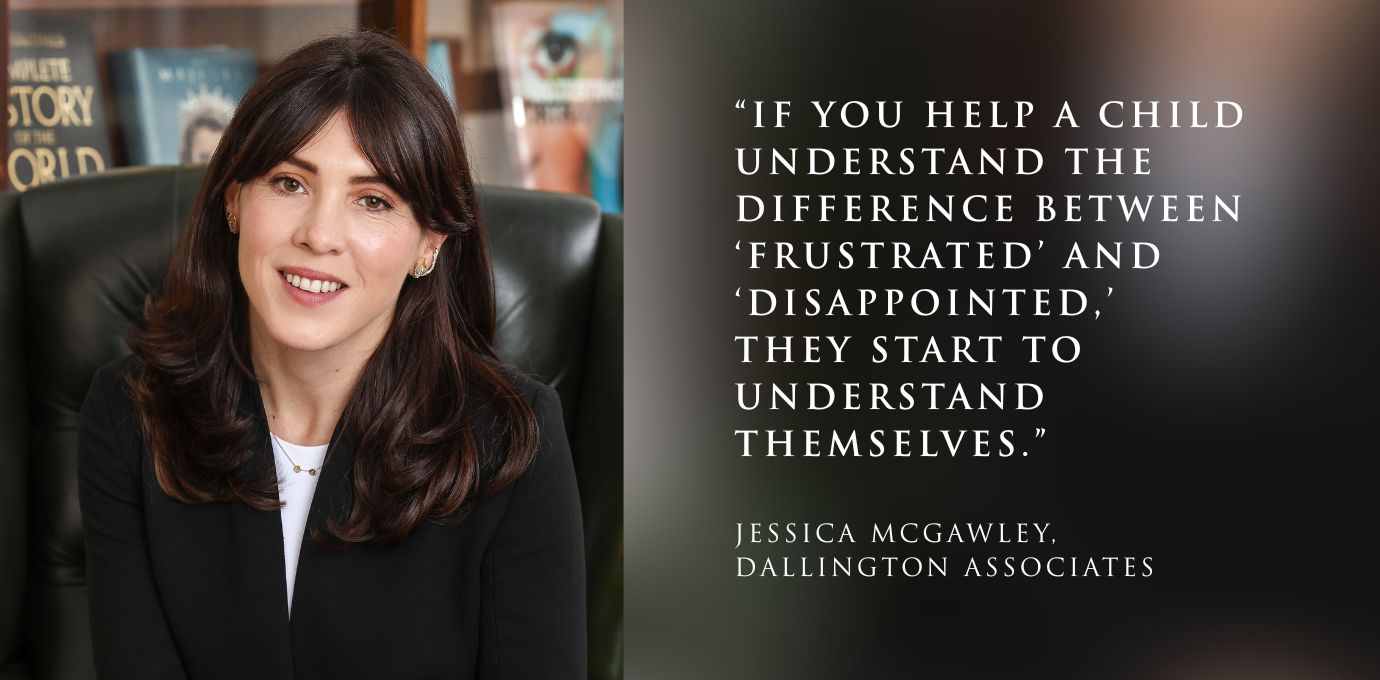Teenagers from wealthy families are often behind in basic life skills. Here’s how private tutors, mentors and parents can help them catch up.
This is the second in a three-part series based on our conversation with psychological consultant Jessica McGawley, founder of Dallington. (Here's the first, in case you missed it). Each article explores how families of exceptional wealth can raise emotionally and practically grounded young adults, and how Tutors International supports that journey.
“He’s incredibly bright, but can’t open a bank account.”
At Tutors International, we’ve heard versions of this story many times. An academically successful, socially poised young person is soon to inherit serious responsibility, yet is unable to perform the most basic adult tasks without help. Things like travel bookings, managing money, writing a formal email, or showing up on time.
They’re cashless, clueless and overwhelmed and it's not a case of laziness or lack of intelligence – it’s a systemic gap.
As Jessica puts it:
“Despite what many may assume, most UHNW young people have very little formal financial education and often grow up at a distance from money. This isn’t about disinterest, it’s simply that things are usually handled for them. Purchases happen quietly, logistics are taken care of, and money rarely changes hands in front of them. So in many ways, they can find themselves less confident, and with less financial fluency, around money than peers from working- or middle-class backgrounds who’ve had more day to-day exposure.”
Growing up in a cashless world
Dallington Associates was founded in 2016 as the first specialist mentorship practice for the Rising Generation – young adults aged 16 to 28 navigating the transition to adulthood in the context of affluence and visibility. Jessica and her team combine mentoring, psychotherapy, family mediation, and educational consultancy under one roof.
Here’s one of the recurring gaps they see:
“For many of these young people, money is an abstraction. They grow up in largely cashless environments, where transactions happen in the background. So when we introduce something tangible - like actual cash, or the price of a pint of milk, and how that price shifts every few months, it lands. That’s inflation. That’s change. And that’s what real-world learning looks like.”
From abstract concepts to meaningful maturity
In one recent tutoring placement, a 17-year-old was asked to help plan the transfers on a family trip. Her tutor showed her how to compare travel options, account for time zones, build a buffer, and stay within a budget.
It took three goes. The first version didn’t account for traffic. The second missed currency differences. But the third worked and was a huge confidence-booster, which leads us to another important point…
Let the consequence stand
This might be the single hardest thing for parents and educators to do, especially when every instinct is pushing you to step in, smooth it over, and rescue them.
But Jessica is clear:
“Just because something went wrong yesterday doesn’t mean you need to fix everything today. What matters is an appropriate, proportionate consequence.”
She recalls a student who forgot his CV for a work experience interview. Instead of rushing it over, the family held back, not out of punishment, but to let him sit with the discomfort and reflect.
“That’s the learning,” she says. “That’s the bit that sticks.”
When a young person stumbles, it’s tempting to step in and smooth it over immediately. But real growth often comes when we pause, reflect, and ask thoughtful questions: What happened? What would you do differently next time?
That’s how accountability is built, not through perfection, but through process.
Habits that build maturity and gratitude
- Let natural consequences happen. Forgot your CV for that work experience interview? You learn to double check next time.
- Start early, stay curious. Introduce concepts like saving, interest, or value-for-money around age 9 or 10 - not as lectures, but in the flow of daily life. Kids are capable of more financial awareness than we often assume.
- Model patience, not perfection. This is about raising adults, not managing appearances. The goal isn’t to have it all figured out, it’s to build awareness, confidence, and the capacity to take responsibility over time.
- Use physical cash. Today’s teenagers may never use cash in the way their parents did, but there’s still real value in handling money physically, even occasionally. When they have to carry it, keep track of it, check their change, or chase it up when they’ve lent it out, it suddenly becomes real. Tap-to-pay can make money feel abstract. Cash doesn’t.
- Narrate your decisions: Young people often miss out on learning how decisions are made, not because they’re uninterested, but because so much happens behind the scenes. Try bringing some of that process into the open. You don’t need to over-explain, just name the thinking: “I’m comparing insurance quotes so we’re not just picking the most expensive by default.” Or “We’ve chosen not to upgrade this time - it didn’t feel necessary.”
This is exactly where tutors offer something distinct. They’re not helicoptering in to shield a child from difficulty. They’re walking alongside the student as a steady, supportive mentor, but with boundaries.
Some parents try to engineer challenge by inserting their teen into an unfamiliar world. But, as Jessica says:
“Kids see right through fake hardship. I once worked with a family who sent their son to work in a Kwik Fit garage. He was like, ‘This is bizarre – I have no interest in cars, why am I here?’ It was completely unrelated to his life or ambitions.”
The intention was good, but the experience didn’t stick.
“Many UHNW parents have very full summer schedules for their children – high-level sport, tech courses, internships. It’s all excellent on paper. But often what these kids need most is the space to be bored - that’s where creativity is born!”
Emotional literacy is the invisible life skill
 One of the most overlooked and quietly essential skills for young people is emotional literacy. And it’s not just UHNW teens; this is something many families wrestle with, says Jessica:
One of the most overlooked and quietly essential skills for young people is emotional literacy. And it’s not just UHNW teens; this is something many families wrestle with, says Jessica:“Teenagers, across generations, often default to just a handful of emotions: ‘tired,’ ‘annoyed,’and ‘anxious,’ – but it’s not enough. Behind those broad terms are often more nuanced feelings trying to be named.”
Emotional literacy isn’t about overanalysing, it’s about helping young people develop a richer inner language.
“We correct children all the time on grammar, manners, pronunciation, but rarely on their emotions,” she says. “If you help a child understand the difference between ‘frustrated’ and ‘disappointed,’ they start to understand themselves.”
It’s a small shift, but a powerful one.
Our tutors are often among the few adults in a child’s life who listen without judgement and mirror back language with gentle precision. Tutors aren’t therapists, but they are emotionally intelligent adults who can sense what’s going on beneath the surface. They give a student tools to name what they’re experiencing and what to do with it.
Independence doesn’t arrive at 18
At Dallington, one of the first questions mentors often ask a young person is, “What are you solely responsible for right now?”
After some reflection, the most common answer, especially from boys, is, “My hygiene.”
“And,” Jessica adds with a smile, “sometimes even that’s a work in progress.”
But that’s the starting point. Great tutors and mentors don’t expect independence to arrive all at once, they build it slowly, intentionally, and in context. Responsibility is added in manageable layers, always calibrated to where the young person actually is, not where we assume they should be.
The goal isn’t to control or correct, it’s to equip them with the confidence and skills to gradually take care of themselves. In real life, over time, and in ways that genuinely stick.
Adam Caller, Founder and CEO of Tutors International, explains:
“Academic success is only part of the picture. We recruit tutors who can support the whole child – emotionally, practically, and personally. When we find the right person, that relationship becomes a safe space for growth. The objective isn’t just great academic results, but whether the young person is ready for their next step.”

